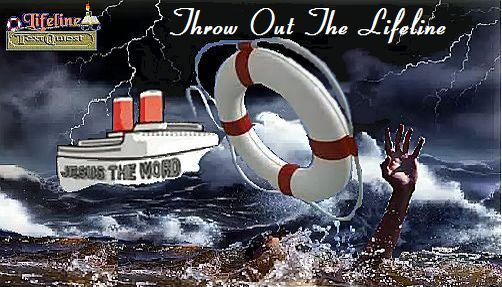


| Q.
Would you mind sharing your knowledge of God's word on just how we
relate to Jesus during the time we are living? I believe
conservative Christians avoid being a cult type "Jesus person"
and avoid Him completely except for a closing to prayers. Do we only
talk thru Him as our mediator or do we also talk to Him directly? I
don't want to ignore Him but I don't want to assume a relationship
that is in any way disrespectful. - JWW. - - answer page #4 |
How do we Scripturally converse with the Godhead? Can Christians talk directly to Jesus? Is the Lord’s Prayer our exclusive guide in speaking with Heaven? We have compared the Lord’s Prayer to David’s prayer in 1 Chronicles 29:10f.
Every student of the Bible probably knows the “Lord’s Prayer” by heart. Some of the elderly would probably remember reciting the prayer daily in a public grammar school. I remember as a child that I really enjoyed the very beautiful song “The Lord’s Prayer” sung by Mario Lanza in the movie, “Because You're Mine.”
But let’s not be hasty to label this as a model for a Christian’s prayer any more than we should teach John’s baptism of repentance as being authoritative for believers today (Acts 19:1-5); both were given prior to Jesus dying on the cross. Those that obeyed John’s baptism after the coming of the Holy Spirit had to be baptized by the gospel’s baptism commanded by the Holy Spirit’s inspiration (Ephesians 3:5i). If the baptism was different, would the way to pray still be necessarily the same?
What is the “Lord’s Prayer”? There are two recordings of this prayer in the synoptic gospels: (1) Matthew 6:9-13 and (2) Luke 11:1-4. The first one (Matthew’s) was recorded as being given during Jesus’ “Sermon on the Mount.” The second one was exclusively given to the Lord’s apostles. Both are the same except for Matthew’s account stipulating that it is a pattern: “after this manner therefore pray ye” while Luke gives it as Jesus’ answer to the disciples’ request to teach them to pray like John taught his disciples. Luke also omits the doxology section, “for thine is the kingdom, and the power, and the glory, forever. Amen.”
Some Observations On The “Lord’s Prayer”
1. It Is An Unitarian Prayer. The “Lord’s Prayer” like David’s prayer in 1 Chronicles 29:10 is an unitarian prayer. Because of my Bible belt background, it has always been disappointing to me to hear a “Protestant” or “Catholic” preacher/chaplain (e.g., in the military), who claims to believe in Jesus, delivering a “unitarian” prayer with no mention of Jesus. By “unitarian” prayer I mean, “Dear God … (petition) … Amen”, and can be uttered to any god or idol by a Muslim, Jew, or Buddhist. Christianity is unique among all religions of the world in professing a belief in God Himself as Jesus coming and living among men, being murdered for our sins, buried, resurrected and ascended into Heaven to rule at the right hand of God, the Father. Other religions may claim to have had their leaders ascend into Heaven but none have claimed to be God. Nor have they claimed to die for our sins. Nor do they rule. Three very important distinctions.
2. It Is Not Really “The Lord’s Prayer.” It is not pers se,“Jesus’ prayer.” David actually prayed his prayer in 1 Chronicles 29. Although by a prophet, it was David’s prayer. It is not recorded that Jesus ever personally used this prayer. A lengthy prayer spoken by Jesus is recorded in John 17.
3. It Addresses “Our Father.” If this were an exclusive requirement for prayer by Christians then our question would be settled; i.e., speaking to Jesus would be a violation.
4. It Is An Non-inclusive Prayer. If “inclusive” means “including or covering all the services, facilities, or items normally expected or required”, then what is labeled as the “Lord’s Prayer” is obviously not an inclusive prayer and therefore was not meant to be a limit to what is to be said in a prayer by a Christian.


5. Things Not Specified In This Prayer. The epistles authorize Christians to pray for the salvation of others (Romans 10:1); to pray “at all times in the Spirit, with all prayer and supplication” (Ephesians 6:17,18); to pray “for boldness in the gospel” (v.18,19; Acts 4:29); to pray for the sick (James 5:14, 15); to pray for wisdom (James 1:5); to pray for leaders in churches (Acts 14:23); to pray for missionaries (Romans 15:30,31); to pray for “discernment of truth” (Philippians 1:9,10); to pray for “the knowledge of his will in all spiritual wisdom and understanding” (Colossians 1:9); to pray that we might “walk in a manner worthy of the Lord, fully pleasing to him, bearing fruit in every good work” (Colossians 1:10); to pray for “supply of what is lacking in faith” (1 Thessalonians 3:10); to pray “for all men; For kings, and for all that are in authority (government); that we may lead a quiet and peaceable life in all godliness and honesty” (1 Timothy 2:1b,2).ii The Lord’s Prayer does not include these.
6. Thanksgiving To The Father Is Absent. Nothing is said for example about giving the Father thanks. However, Christians are to give thanks to God in prayers (1 Thessalonians 5:17–18). Christians are commanded to sing and make melody in their hearts to Jesusiii But at the same time they are commanded to give thanks always for all things to the Father in Jesus’ name.iv
7. The Lord’s Prayer Isn’t “in Jesus’ name.” “The Lord’s Prayer” does not include the expression “in the name of Christ.” But we know that later immediately prior to His crucifixion, He tells his apostles, “And in that day ye shall ask me nothing. Verily, verily, I say unto you, Whatsoever ye shall ask the Father in my name, he will give it you. Hitherto have ye asked nothing in my name: ask, and ye shall receive, that your joy may be full” (John 16:23, 24).
This is at the “Last Supper” (He is about to be arrested and crucified) Jesus says that He expects His followers henceforth to make requests of The Father in His name. However, it is true that “in Jesus’ name” is, as we have continuously pointed out, means “by the authority of” (compare to the “great commission” recorded in Matthew 28:18-20), please note that in this context Jesus is contrasting asking the Father in Jesus’ name to one’s asking Jesus personally (John 16:23).
8. It Is A Model Prayer. Jesus indicated that it was a model for prayer; i.e., “in this manner” (Matthew 6:9). Some denominations teach that the “Lord’s Prayer” is to be recited verbatim. The Didactic (second or third century) required it to be recited three times a day. But the Greek wordv, which introduces the text of the prayer in Matthew’s account, according to the Pocket Lexicon To The Greek New Testament, is an adverb that means “in this way.” “In this way” meant “in this manner”, or “thus”, “so”, “under these circumstances” (e.g., Matthew 19:10).vi Jesus was not giving a ritual to be a empty (vain) repetition (Matthew 6:7).
9. The Kingdom had not come. The request for the Kingdom (“Thy Kingdom come”) indicates that the Kingdom had not yet come when Jesus addressed praying. It therefore is pre-Christian and not “Christian” as is sometimes promoted. Christians know that the Kingdom which wordvii means “rule” came when Jesus “sit on the throne of David” (Acts 2:30) on the day of Pentecost after Jesus’ resurrection (i.e., the church is the kingdom, Colossians 1:13-18; Jesus’ Kingdom will end when He comes again and the last enemy death is destroyed, 1 Corinthians 15:25).
Does this mean that the prayer is not applicable at all for Christians. I think not. It is a part of Scripture and all Scripture, even the Old Covenant writings, are profitable for our study in spite of the fact that we are no longer under their Levitical system.viii And if Jesus, as well as Johnix, was preparing disciples morally for the imminent Kingdom, then it can have limited application to those that eventually were added to the Kingdom.x The difference would be to update it with one’s added knowledge as transmitted by the Spirit of Truth who was sent directly to guide the apostles “into all truth” which would be recorded in Acts and the epistles (John 16:13,14).
Why then did Jesus give the prayer if it did not mean “to be recited” by Christians?
Continued.
- Gaylon West
THROW OUT THE LIFELINE
i “Which in other ages was not made known unto the sons of men, as it is now revealed unto his holy apostles and prophets by the Spirit” (Ephesians 3:5).
ii https://www.desiringgod.org/articles/what-to-pray-for
iii Ephesians 5:19 “Speaking to yourselves in psalms and hymns and spiritual songs, singing and making melody in your heart to the Lord;”
iv Ephesians 5:20. “Giving thanks always for all things unto God and the Father in the name of our Lord Jesus Christ;”
v οΰτως
vi See also, Liddell & Scott (1940) A Greek–English Lexicon, Oxford: Clarendon Press.
vii βασιλείαG932 “rule; reign”, Strong’s and Thayer’s
viii Romans 15:4 “For whatsoever things were written aforetime were written for our learning, that we through patience and comfort of the scriptures might have hope.” All Scriptures (writings) are inspired and for our learning. 2 Timothy 3:16. “All scripture is given by inspiration of God, and is profitable for doctrine, for reproof, for correction, for instruction in righteousness:.”
ix Luke 1:17 “And he shall go before him in the spirit and power of Elias, to turn the hearts of the fathers to the children, and the disobedient to the wisdom of the just; to make ready a people prepared for the Lord.”
x Acts 1:6-8 “(6) When they [apostles] therefore were come together, they asked of him, saying, Lord, wilt thou at this time restore again the kingdom to Israel? … (8) [Jesus said] But ye shall receive power, after that the Holy Ghost is come upon you: and ye shall be witnesses unto me both in Jerusalem, and in all Judaea, and in Samaria, and unto the uttermost part of the earth.” [Later] Colossians 1:13, apostle: “Who hath delivered us from the power of darkness, and hath translated us into the kingdom of his dear Son.”

|